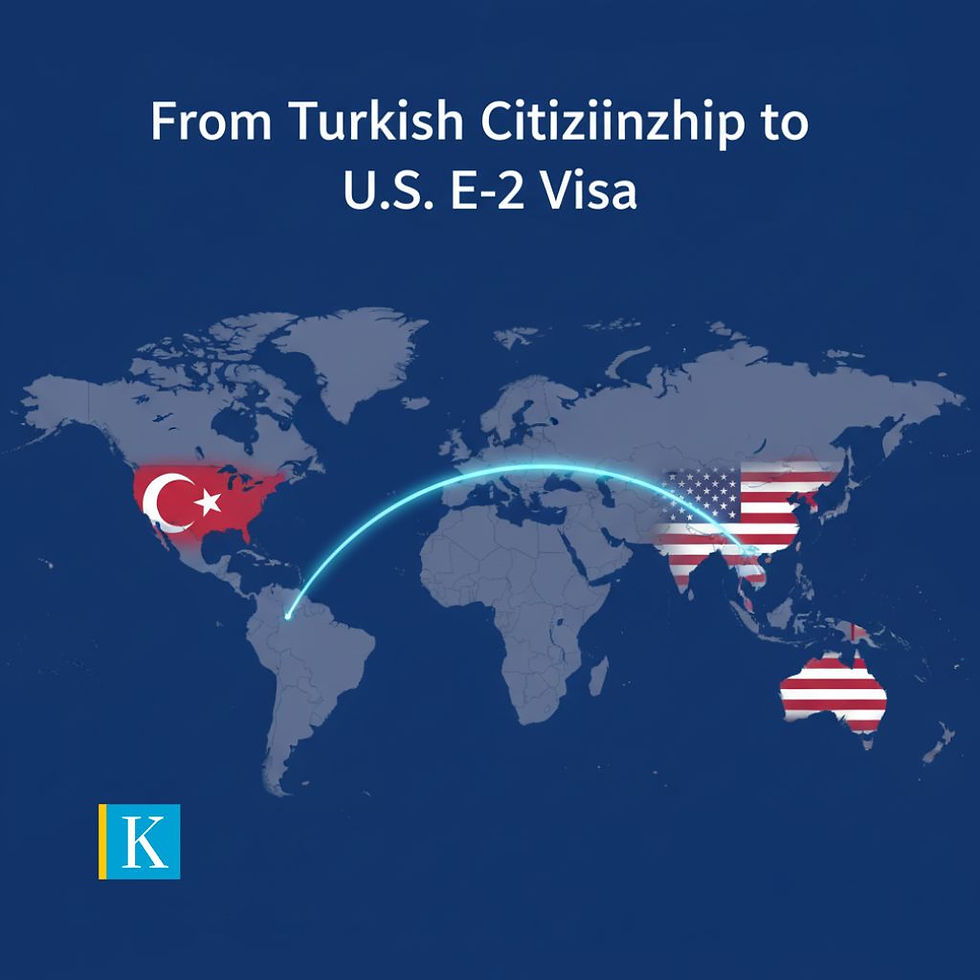Turkish Citizenship and U.S. E-2 Visa: A Complete Guide for Investors in 2025
- Özgür Kurucuk

- Sep 27, 2025
- 4 min read
Updated: Sep 29, 2025

The Turkish Citizenship by Investment (TCBI) program continues to be one of the most effective global mobility strategies in 2025. For investors worldwide, Turkey’s status as an official E-2 treaty country creates a unique pathway: secure a Turkish passport and then apply for the U.S. E-2 Treaty Investor Visa.
This makes Turkish citizenship for E-2 visa particularly attractive to investors from non-treaty countries such as India, China, and parts of the Middle East, where direct E-2 access isn’t available. By leveraging the E-2 visa through Turkish passport, families gain opportunities in both Turkey and the United States.
In this 2025 guide, you’ll learn about investment options, updated processes, timelines, benefits, risks, and costs—all designed to help you decide if this dual-track solution fits your global goals.
What is Turkish Citizenship by Investment?
Turkey citizenship investment program explained
The Turkish CBI program in 2025 remains a fast-track route to citizenship, offering approval in 3–6 months without residency or language tests.
Minimum investment for Turkish passport (2025 thresholds)
Real Estate Investment – $400,000 minimum (3-year hold, title deed lock).
Bank Deposit Option – $500,000 minimum (converted into TRY, blocked for 3 years).
Capital Investment or Government Bonds – $500,000+.
Job Creation – 50 employees.
Note (2025 update):
The Turkish government removed the YUVAM account option. Bank deposits must now be held fully in Turkish Lira, with no foreign exchange protection, exposing investors to currency fluctuation risks.
Benefits of Turkish passport in 2025
Visa-free or visa-on-arrival to 110+ destinations.
Dual citizenship permitted.
Access to the U.S. E-2 Visa.
Long-term Schengen visa opportunities.
Full rights in Turkey for healthcare, education, and business.
Understanding the U.S. E-2 Treaty Investor Visa (2025 Outlook)
What is the E-2 visa USA?
The E-2 Investor Visa allows nationals of treaty countries (like Turkey) to invest in and run a U.S. business.
E-2 investor visa requirements (2025)
A substantial investment (typically $100,000+).
At least 50% ownership in the U.S. enterprise.
Proof of an active business, not a passive investment.
Filing through Form DS-160, business plan, and supporting documentation.
E-2 visa benefits (2025 edition)
Spouse work authorization.
Children under 21 access U.S. education.
Indefinitely renewable, provided the business operates.
The Bridge – Turkish Citizenship for E-2 Visa
Why Turkey is an E-2 treaty country
Turkey has maintained its E-2 treaty relationship with the U.S. since 1990, making Turkish nationality one of the most practical routes for indirect U.S. access.
Step-by-step guide: Turkish citizenship to E-2 visa (2025 process)
Invest in Turkey (real estate, bank deposit, or capital).
Secure Turkish residency and citizenship (3–9 months).
Obtain Turkish passport.
Establish or invest in a U.S. business.
Apply for E-2 visa at a U.S. consulate with a strong business plan.
Attend interview, get approval, and move to the U.S.
Total cost in 2025
Turkish citizenship investment: $400,000–$500,000+.
Legal and administrative fees: 5–7% extra.
E-2 visa costs: $5,000–$15,000 (legal + government).
Combined cost: ~ $420,000–$520,000+ depending on investment route.
Risks, Challenges & 2025 Considerations
Policy changes: Investment thresholds may increase beyond $400,000–$500,000.
Currency risks: Deposits must now remain in Turkish Lira, which fluctuates.
Scam risk: Beware of agents offering guarantees or below-threshold options.
E-2 dependency: If your U.S. business fails, your E-2 status lapses, though Turkish citizenship remains permanent.
Legal guidance is critical—working with experienced English-speaking Turkish lawyers in Istanbul, such as Kurucuk & Associates, ensures compliance with evolving 2025 rules.
Success Cases & 2025 Trends
Indian entrepreneurs: Using Turkish citizenship to unlock U.S. entry via E-2.
Chinese investors: Diversifying assets through Turkish real estate while planning U.S. startups.
Middle Eastern families: Balancing secure lifestyle in Turkey with U.S. education for children.
FAQs about Turkish Citizenship and U.S. E-2 Visa: Turkish Citizenship by Investment (2025 Updates)
Is Turkey a good place to live and invest?
Yes. Turkey offers a strategic location bridging Europe and Asia, a growing real estate market, affordable living costs, quality healthcare and education, and visa-free access to 110+ countries.
What is the E-2 investor visa for the United States?
The U.S. E-2 visa allows nationals of treaty countries, like Turkey, to invest in and actively manage a business in the United States.
How does Turkish citizenship allow me to apply for the US E-2 visa?
Turkey is an official E-2 treaty country. Once you acquire Turkish citizenship by investment, you become eligible to apply for the U.S. E-2 visa using your Turkish passport.
What are the investment requirements for the E-2 visa?
Applicants must make a substantial investment (often $100,000+), own at least 50% of the business, and prove it is real and operational—not a passive investment.
Can my family also come to the US with me on an E-2 visa?
Yes. Spouses and children under 21 can accompany you. Spouses are eligible for work permits, and children can study in the U.S.
Does the E-2 visa lead to a US Green Card or citizenship?
No. The E-2 is a non-immigrant visa, but it can be renewed indefinitely as long as the business operates. For permanent residency, you must switch to another visa category.
How does the E-2 visa benefit compare to other citizenship by investment programs?
Unlike many CBI programs, Turkish citizenship offers a direct bridge to the U.S. via the E-2 visa, making it more versatile for investors seeking global mobility and American market access.
Start Your Pathway from Turkey to the USA in 2025
Our expert team at Kurucuk & Associates helps investors secure Turkish citizenship and qualify for the U.S. E-2 Visa.
Contact us today for tailored legal guidance.





